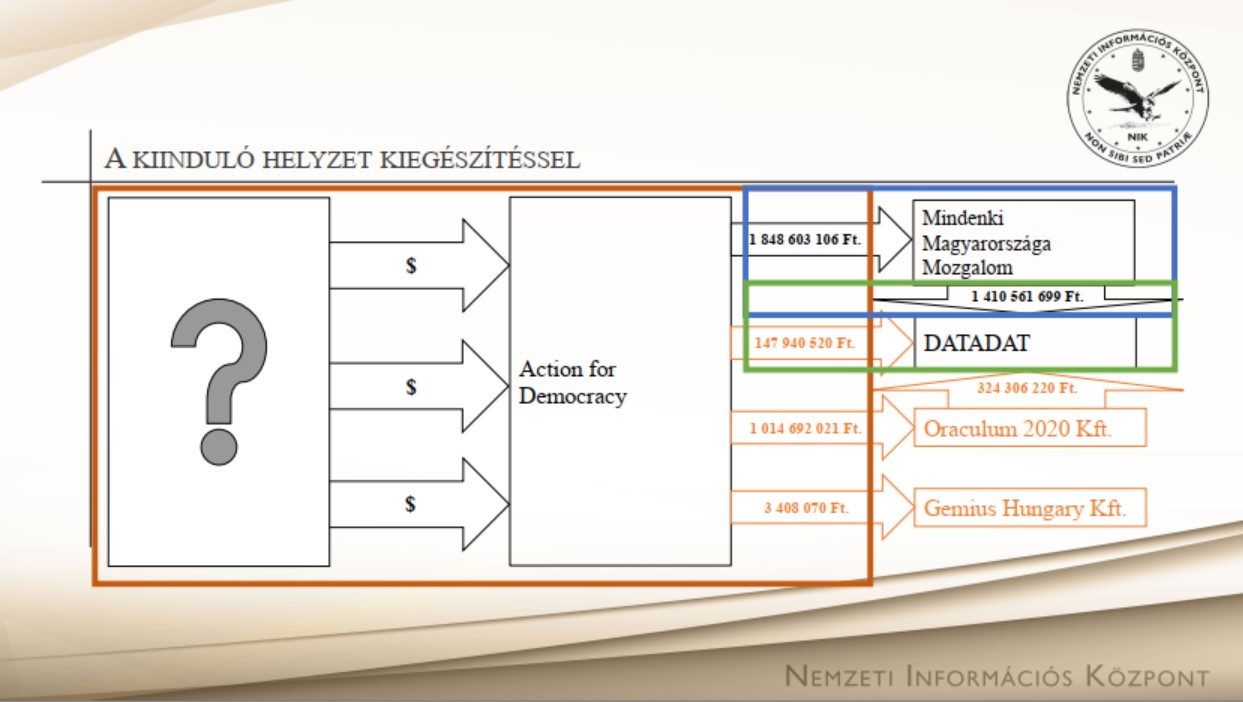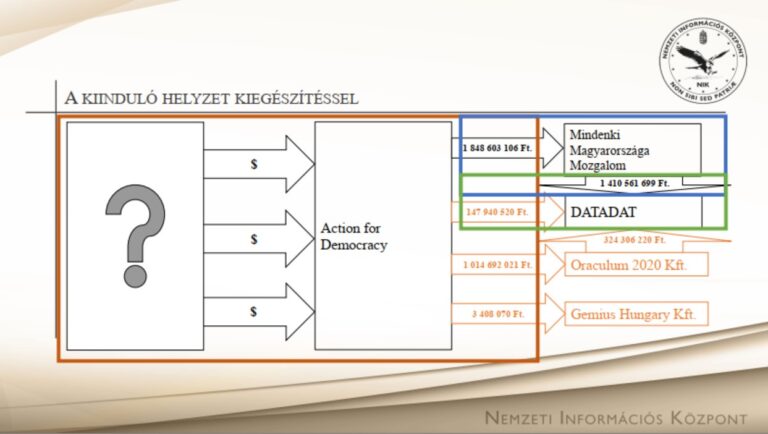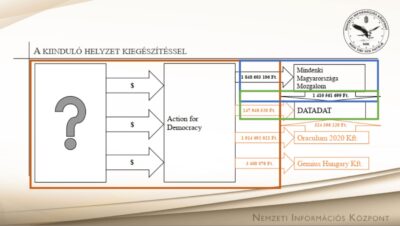According to a declassified presentation of the Hungarian security services, the lion’s share of millions of dollars wired from the United States to Hungary ended up at a network of companies doing online political marketing based on data collection, which were built up around emblematic faces of socialist former governments. There are many question marks around the investigation, as the supposed sources of the donations totaling about 9 million USD are only hinted at in the public material.
This article was originally published on english.atlatszo.hu.
On Wednesday afternoon, the slides of the presentation the members of the national security committee of the Hungarian parliament attended a week ago during a closed hearing was published on the committee’s website. The minutes of the hearing, as well as the report itself that comprises the basis of the presentation — which is not the final one the committee will receive on the matter — are still classified.
A supplemental letter, written by the director of the National Information Center (NIK) that was also published along with the declassified presentation summed up what parts of the still classified report can be made public. These details mainly entail the wire transfer data following the path of the money sent by US-registered NGO Action for Democracy (AD) to Hungary.
According to NIK’s findings, which are an aggregate of data from the security services, the police and the tax authority, the lion’s share of the millions of dollars sent by AD ended up at a leftist political influence machine, the existence of which was first reported by Atlatszo nearly three years ago, after the municipal elections of 2019.
The “Cambridge Analytica” of former Socialist leaders
This network of companies does online political marketing. Its key elements are the Datadat group of companies, who are in the data collection and analysis business, and a group of opposition-leaning propaganda “news sites” named Ezalényeg.
Gordon Bajnai, a former PM then supported by the Hungarian Socialist Party, his former minister for security services Ádám Ficsor, his former campaign manager Viktor Szigetvári are all involved in the Datadat group, as well as the head of the digital research institute at the ELTE university Tibor Dessewffy, who is an old confidante to Bajnai’s predecessor, former socialist PM Ferenc Gyurcsány.
Atlatszo exposed almost three years ago how the machine worked during the municipal elections of 2019, which ended with a relative success for current PM Viktor Orbán’s opposition. At that time, we’ve learnt from several independent sources that Datadat was segmenting and choosing the target groups to which Ezalényeg’s content was then advertised on Facebook.
Though during the campaign in 2019 Ezalényeg spent only 68 million HUF on Facebook advertising, the now public presentation of NIK pertains to sums several orders of magnitudes greater. Out of about 9 million USD that was wired to Hungary by Action for Democracy, Hungarian forints worth altogether about 7.75 million USD wound up in the end with members of the Datadat group or the company Oraculum 2020 Kft., which is the publisher of Ezalényeg.
The Everybody’s Hungary Movement (MMM) of former prime ministerial candidate Péter Márki-Zay received 5.4 million USD from AD. According to NIK’s data, the bigger part of this cash was transferred to the Datadat group.
AD has announced before the general elections in spring 2022 that it would help MMM by collecting donations from Hungarian citizens living abroad, but the magnitude of the support was only revealed — by Márki-Zay himself — this autumn. According to various estimates, the total sum of AD’s cash injections are on par with the amount of all the other funds the united leftist opposition, which supported Márki-Zay for PM, was able to spend on the campaign.
The tax authority (with the suspicion of defrauding public finances) and the police (with the suspicion of money laundering and embezzlement) has ongoing investigations related to the matter. Hungarian security services also run an unspecified investigation. The coordination of these investigations and the analysis of the incoming data belongs to NIK, a new security organ under minister Antal Rogán. The national security committee of the Hungarian parliament is promised to be kept informed of new developments on the matter by NIK in the future.
In the presentation, various US- or EU-based organisations are mentioned. The National Endowment for Democracy, a nonprofit donor entity funded primarily by the US Congress was, for example, allotted several slides in the file. But currently there is no information available as per to who exactly provided AD with the sum wired to Hungary.
It is also unclear at the moment what exact action provides the basis for the various investigations of the involved authorities. Members of the Datadat group, Oraculum 2020 and Gemius Hungary Kft., another recipient of the donations, are all private companies. MMM is a non-governmental organisation. None of these organisations fall under the legal provision banning political parties from the acceptance of funding from abroad.
NIK director Zoltán András Kovács wrote in his letter that “assessment and analysis procedures are still ongoing with regards to what the concerned Hungarian non-governmental organization and companies used the grant for”. The director must have forgotten to inform his colleague editing the slides that this process is a work in progress, as the presentation is titled “The overview of foreign campaign grants of the united opposition”.
Original story in Hungarian.
 Support independent investigative journalism in Hungary,
Support independent investigative journalism in Hungary,
become a patron of Atlatszo on Patreon!
You can also donate here.
Márton Sarkadi Nagy
Hungarian reporter at Átlátszó, with 10+ years experience in doing investigative reporting for various Hungarian outlets. Based in Budapest.







